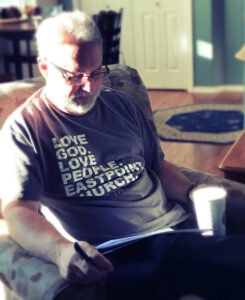Not too long ago, I heard a phrase that deeply bothered me: “Greasy gracers.” It was used in this sentence, “I’m tired of seeing you greasy gracers rationalize your sin and act like your failures are no big deal!”
The term greasy gracer is intended to put people like me in their place, as it expresses frustration with the many times I’ve pointed to God’s grace and mercy in my life.
For the record, rationalizing sin is never okay, and our failures are a big deal. Of course, obedience matters to God, and grace never replaces faithfulness. Thankfully, however, our Savior’s payment for our sins covers everything. Our past, present, and future failures. That’s why God’s grace and mercy matter most.
Admittedly, my life is stained with a string of too many failures, but too many Christians are tarnished by a tendency to be harsh. According to them, “greasy gracers” are those who use and abuse God’s grace as an excuse for their lack of spiritual discipline.
While some of my favorite Scriptures speak of God’s goodness and kindness, some of my Pharisaical friends like to point out the scriptural demands for purity.
They are not wrong when they remind us that we are to be holy because God is holy (1 Peter 1:16). However, they miss that Peter, who was far from perfect and always a work in progress, later stated in the same letter that “love covers over a multitude of sins” (1 Peter 4:8).
Read the gospels; it won’t take long to recognize a pattern in Jesus’s life. He was merciful and kind to the broken but tough on the self-righteous and hyper-religious (i.e., those who focus on rules and regulations).
The Pharisees of Jesus’ day were strict about sin and hard on people who didn’t meet their religious standards. They were disgusted with the people Jesus hung out with regularly. Mark records that Jesus ate with many tax collectors and sinners, and the Pharisees were livid about it (see Mark 2:15-17). But Jesus invested time with the messed-up and broken—the pariahs of His culture—because He knew they were the ones He came to save. He told the Pharisees, “It is not the healthy who need a doctor, but the sick” (Luke 5:31, NIV).
I appreciate what Brennan Manning wrote about Pharisees. “The Pharisees, who carried religion like a shield of self-justification and a sword of judgment, installed the cold demands of rule-ridden perfectionism . . . they falsified the image of God into an eternal, small-minded bookkeeper whose favor could be won only by scrupulous observance of laws and regulations. Religion became a tool to intimidate and enslave rather than liberate and empower. (Herein lies the genius of legalistic religion—making primary matters secondary and secondary matters primary.)
I’m a grace guy and unapologetic about it. And because of my focus on grace, many times throughout my almost forty years in ministry, I was told that I was soft on sin, that I preached a watered-down gospel, and that I taught that holiness is optional.
At a church service one day, I spoke about how mercy and grace complement each other. After the service, a large man whom I’d never met before made a beeline for me. He wasn’t smiling. He didn’t look happy. And I knew I was about to get blasted.
He got way too close to me, leaned over a bit because he was much taller than me, and said, “Can I ask you a question?”
I resisted my typical reply, which is, “Can you or may you?” But he didn’t wait for my reply anyhow.
“Do you ever preach about sin and holiness around here, or are you one of those modern preachers who just tickle people’s ears with what they want to hear?”
Again, I resisted saying what I wanted to say, “So, you mean like the sins of pride or sowing discord among the brethren?” Instead, I took a deep breath and did what I often do—I answered him with a question. “Please tell me where you’re coming from. Why are you reacting so strongly to the topics of grace and mercy?”
He leaned in so close I could smell bacon and coffee on his breath. “Because I’ve been to five churches like this one over the last two months and they’re all soft of sin!”
I stepped back (in case he was going to take a swing at me), and said, “Brother, thank you for visiting us today, but I’m always going to land first and foremost on the side of grace. Always. Perhaps I can help you find a church that will work better for you.” With a look of disgust, he shook his head, said nothing, turned, and walked away, grabbing his embarrassed wife on the way out. I don’t know him so it would be unfair of me to judge, but I suspect he was a modern-day Pharisee and hyper-religious Christian who focuses a lot on rules, regulations, and everybody else’s sin.
I am not soft on sin. I do not dilute anything. And holiness is not optional. Without question, we are called to follow Jesus, to walk in obedience, and to put off the old man daily.
However, in my sixty-six years of life on this planet, I have never met anyone (including my anti-greasy-gracer-friends) who are perfect in their practice as saints. I have never seen anyone always get it right when it comes to being righteous all the time.
What I have noticed is a tendency to pose and pretend. I have seen people tend to forget that “mercy triumphs over judgment” (James 2:13, NIV). And what makes me sad is how quick we are (and that includes me) to throw people under our religious bus.
As someone once said, “Just because your sins are more secret than mine doesn’t make you any more perfect than me.”
To be clear, being under grace does not negate obedience, faithfulness, gentle correction when needed, or doing our best to walk in the Spirit and bear the fruit of the Spirit. To be Christlike is to be like Christ. Period. End of story. Sadly, however, sometimes we get saved by grace and act like we stay saved by our works. We don’t. None of us is good enough to earn anything from the Father on our best day. Not before. Not now. Not ever.
Sadly, two thousand years later, we still sometimes struggle with a religious culture of Pharisees—men or women who focus on what we must “do” rather than on what has been “done” for us by Jesus.
So, what follows is a list of common traits of modern-day Pharisees. If you recognize any of these behaviors in your life, ask Jesus to change your heart to be more like His.
Seven Signs of a Modern-Day Pharisee:
- Pharisees make being right more important than being relational. It’s not that being wrong is ever right, but Jesus always put people first and demonstrated unconditional love. His love for us is never based on our performance.
- Pharisees hold on to their religious traditions and make them a litmus test of acceptance. If you’ve sat in a church service and thought, “That’s not the way it’s done,” then you might be focused too much on form over genuine faith.
- Pharisees think they’ve got insider knowledge and look down on others for not being as spiritually informed as they are. But Jesus came for the outsiders, not the insiders.
- Pharisees pride themselves on their outward appearance when it comes to holiness. Jesus always looks at the heart.
- Pharisees are intolerant and narrow-minded. They have a long list of “dos and don’ts” that define what is and isn’t okay. They think we can (and should) legislate morality. They reject the idea that the Bible is gray on many issues. Jesus would never say that “anything goes” or deny the commands of God regarding a godly lifestyle, but His to-do list was much shorter—“love God, love people.”
- Pharisees often talk more about what they are against rather than for, and they feel the need to defend God. A critical, argumentative, and combative spirit is not Christlike. Joy and freedom should mark the life of a believer.
- Pharisees are defensive and self-protective. The irony of these traits is tragic, for they love to rebuke but hate to be corrected. Jesus called us to be humble servants (Matthew 23:10-12; Luke 14:11).
One last and final challenge. If you’ve been thinking that so-and-so needs to read this, maybe it’s best if you reread it and ask the Holy Spirit to reveal any pharisaical tendencies in your heart.
Too often and in too many ways, I am a recovering Pharisee who needs to remove the log from my own eye before I worry about anyone else.
Here’s a sad reality: most Pharisees started well and once marveled at God’s mercy and grace, but time and religion (at its worst) taint all of us.
So, take a moment and do a heart check before you wag your finger in shame at others. Only a stubborn Pharisee will refuse to do so.




